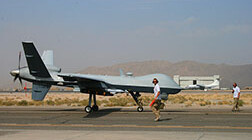Ethics & International Affairs, the journal of Carnegie Council, is pleased to present a collection of recent work on the ethics of autonomous weapon systems (AWS).
Technological advances in recent years have spurred increasing debate surrounding AWS, or, more colloquially, killer robots, including whether and how these weapons should be used, and how they may be properly governed. Ethics & International Affairs is committed to furthering this debate and invites you to access all of the content below FREE for a limited time.
Autonomous Weapon Diplomacy: The Geneva Debates In this EIA online exclusive, Jean-Baptiste Jeangène Vilmer reports on the negotiations and major issues at the most recent informal experts' meeting on lethal autonomous weapons systems, which took place in April 2016 at the UN Convention on Certain Conventional Weapons (CCW) in Geneva.
Robots and Respect: Assessing the Case Against Autonomous Weapon Systems In this feature article, Robert Sparrow argues that the ethical case for allowing autonomous targeting, at least in specific restricted domains, is stronger than critics have typically acknowledged, but that such targeting still remains ethically problematic. (EIA 30.1) EIA Interview with Robert Sparrow on Autonomous Weapon Systems and Respect in Warfare In this interview podcast (with transcript), Sparrow elucidates his reasoning for classifying autonomous weapon systems as mala in se and how means of warfare become normalized. Robots and Respect: A Response to Robert Sparrow Ryan Jenkins and Duncan Purves respond to Sparrow's article in EIA 30.1, arguing that the distinction between autonomous weapon systems and widely accepted weapons is illusory, and therefore cannot ground a moral difference between AWS and existing methods of waging war. (EIA 30.3)
Robots as "Evil Means"? A Rejoinder to Jenkins and Purves In this rejoinder, Sparrow responds to his critics, arguing that many of the objections they make to his article ultimately stem from a deeper disagreement about the usefulness of the concept of mala in se with regard to weapons of war. (EIA 30.3)

